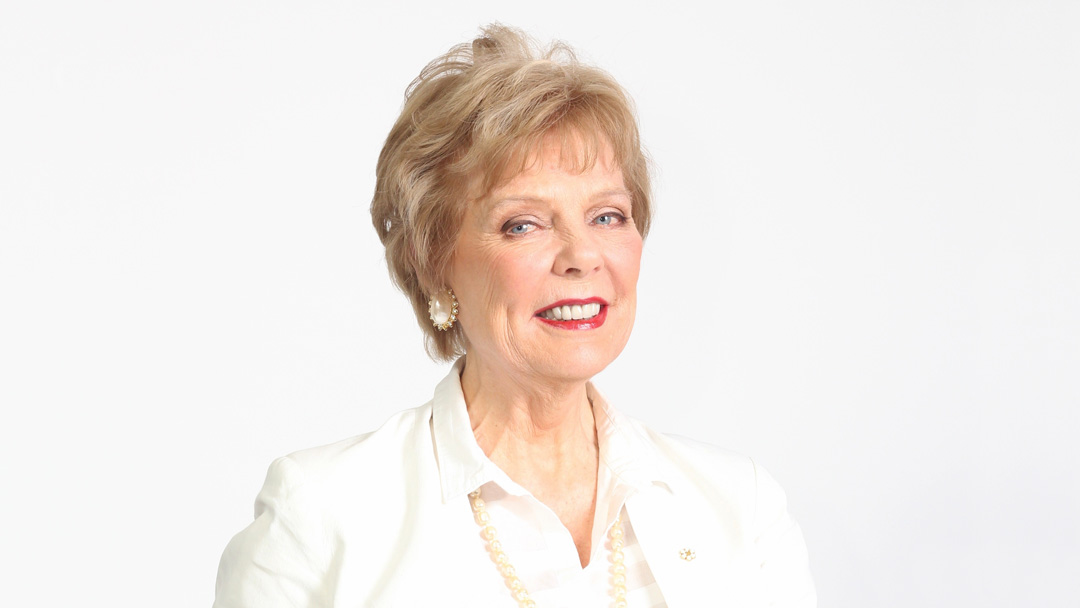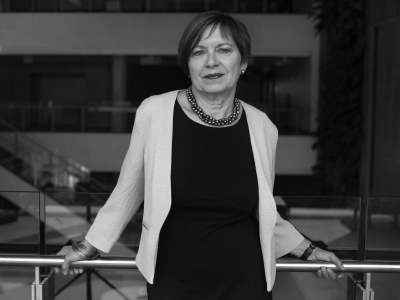This profile was part of the Faculty of Public Affairs’ 75 for the 75th series, which highlighted 75 notable alumni in FPA in honour of Carleton University’s 75th anniversary. These stories were published in 2016 and 2017.
Adjunct Professor, Schulich School of Business, York University
President, CTV (2000-2002)
Bachelor of Journalism (’64)

Trina McQueen’s innate curiosity led her into the world of journalism very early on. As a teenager, she wrote the high school activities column in her hometown paper, The Belleville Intelligencer.
Then, after studying journalism at Carleton, she reported for the Ottawa Journal before landing a job as a reporter at the Toronto television station CFTO in 1966.
“I was the first female reporter, but the news director never told the station manager he was hiring a woman,” recalls Ms. McQueen, who also served as co-anchor on the fledgling program W5. “After a budget cut, the station manager told the news director to fire me because he felt women did not have the authority to report the news. I was saved from the axe, but I knew I had to leave.”
Soon after, Ms. McQueen was recruited to CBC.
“In 1967, it was a very different place than it is now. The technology was primitive and the newsroom was populated by people who had made their career in print,” recalls Ms. McQueen. “But one thing that was the same was the sense of mission. People weren’t there to make a lot of money. They wanted to do good journalism.”
By 1976, Ms. McQueen was named executive producer of The National, where she hired journalism icons Peter Mansbridge and Knowlton Nash. Four years later, she became network program director for all of CBC Television.
“I was scheduling everything from dramas to hockey playoffs and at first I had no clue how to do it, but I adored the job,” says Ms. McQueen. “I love television. To me, the most profoundly interesting and engaging storytelling was on the screen. It still is.”
Ms. McQueen returned to news and current affairs eight years later to oversee the launch of the CBC’s cable news channel, CBC Newsworld. It was one of the most ambitious—and contentious—projects of her career.
“Although journalists like to report on change, they really hate change. There was a great deal of suspicion about Newsworld and a fear that it would degrade other programs,” she recalls. “But after a few months on air, the Oka crisis happened and we decided to go live with it. For the first time, Canadians were able to turn on their TVs and see a news event actually happening.” The CBC news channel became and still is the country’s most watched cable news.
At the same time, specialty cable channels were beginning to take shape. Ms. McQueen left CBC to become the head of the Discovery Channel.
“It was the beginning of the digital age, and we were the first channel to put up a web site,” she says. “We also introduced the world’s first daily current affairs program about science and technology, now called Daily Planet.”
When CTV bought the Discovery Channel in 1999, Ms. McQueen was asked to become Executive Vice-President of CTV; later she was named President and Chief Operating Officer.
It was the third time in her career that Ms. McQueen occupied the executive offices at a television network. She credits a number of factors for her success.
“I hardly ever applied for a job in my life. I just took the opportunities as they came,” explains Ms. McQueen, who received the Order of Canada in 2005 and is now Adjunct Professor at The Schulich School of Business at York University, where she teaches a number of courses in media management. “I always say that a successful career requires talent, good luck, timing, and hard work—and there’s only one of those you can control.”
Ms. McQueen remembers Carleton’s journalism program as a hothouse of creativity, curiosity, investigative spirit and a strong sense of mission. She understands why young people are attracted to journalism, as she was, but she also tries to offer a dose of reality.
“I tell them that if they think journalism is a glamorous job, don’t bother. If they don’t have a sense of mission, don’t bother,” she explains. “But if they want to help make the world better, they should go for it.”
Wednesday, November 16, 2016 in #FPA75, Career Paths, Journalism
Share: Twitter, Facebook



